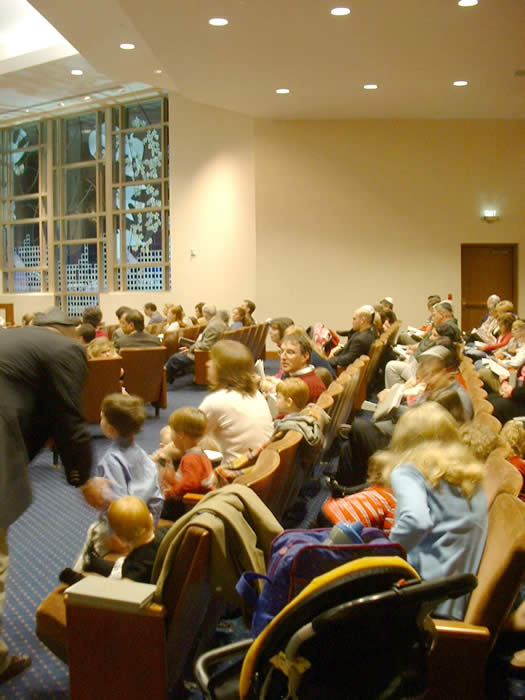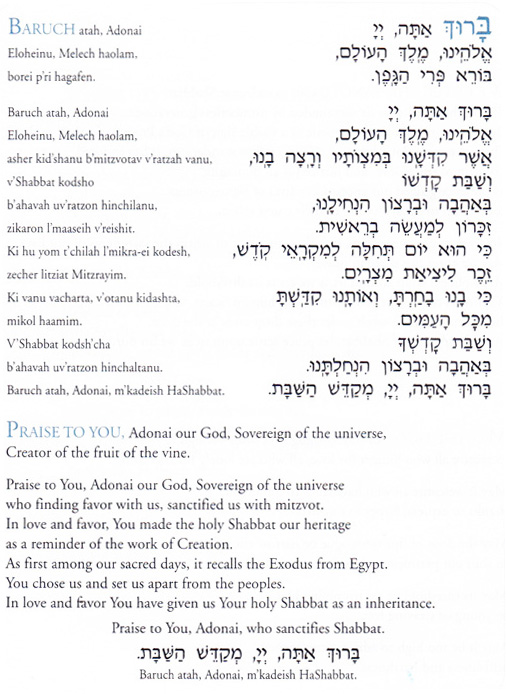| Dec 3, 2024 :: 2 Kislev 5785
contact us |
|||||||||||||||||||||||||||||||||||||||||||||||||||||||||||||||||||||||||||||||||||||||||||||||||||||||||||||||||||||||||||||||||||||||||||||||||||||||||||||||||||||||||||||||||||||||||||||||||||||||||||||||||||||||||||||||||||||||||||||||||||||||||||||||||||||||||||||||||||||||||||||||||||||||||||||||||||||||||||||||||||||||||||||||||||||||||||||||||||||||||||||||||||||||||||||
|
|
|||||||||||||||||||||||||||||||||||||||||||||||||||||||||||||||||||||||||||||||||||||||||||||||||||||||||||||||||||||||||||||||||||||||||||||||||||||||||||||||||||||||||||||||||||||||||||||||||||||||||||||||||||||||||||||||||||||||||||||||||||||||||||||||||||||||||||||||||||||||||||||||||||||||||||||||||||||||||||||||||||||||||||||||||||||||||||||||||||||||||||||||||||||||||||||
Home >> House of Worship >> Prayers
T'Filah-Avot
The Kiddush
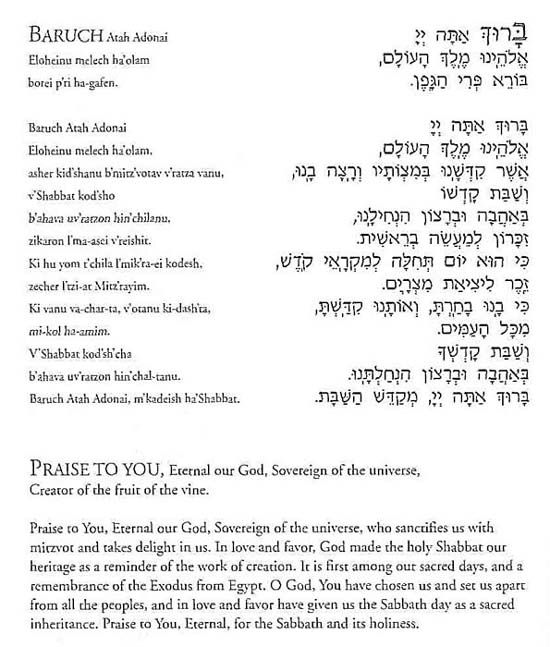
Click Here to listen to the Kiddush
|
|||||||||||||||||||||||||||||||||||||||||||||||||||||||||||||||||||||||||||||||||||||||||||||||||||||||||||||||||||||||||||||||||||||||||||||||||||||||||||||||||||||||||||||||||||||||||||||||||||||||||||||||||||||||||||||||||||||||||||||||||||||||||||||||||||||||||||||||||||||||||||||||||||||||||||||||||||||||||||||||||||||||||||||||||||||||||||||||||||||||||||||||||||||||||||||
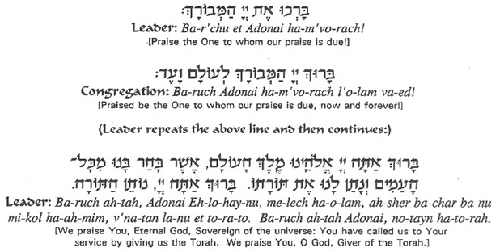 |
Blessing After Reading Torah |
 |
Click Here to listen to the Blessings. |
The Barchu
The Barchu is a call to prayer that affirms God's oneness and readies us for the Sh'ma, which is the core of the service. The Rabbis of the Talmud teach that "the one who prays with the congregation will have their prayer answered." Tradition says that a minimum of 10 must gather to pray. We bow and bend our knees when we respond Baruch ata Adonai, a gesture that indicates respect for our sovereign deity.
 |
Click Here to listen to the Barchu |
Haftarah Blessings
 |
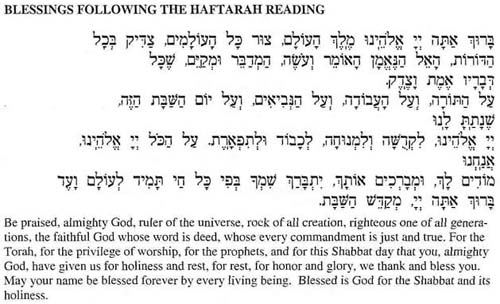 |
Click Here to listen to the Blessings. |
The Shema
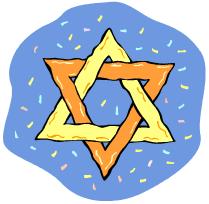
The Sh'ma is Judaism's most fundamental declaration of God's sovereignty from Deuteronomy 6:4. Hear O Israel: Adonai is our God, Adonai is One. We often say this prayer with our eyes covered or closed in order to block distractions and center ourselves. It is prayed standing as a sign of respect. The second declaration, Blessed is the glorious Name! Your majesty is forever! is a later insertion by the Rabbis of the Talmud in order to emphasize the prayer's power.
 |
Click Here to listen to the Shema |
The Veahavta
V'ahavta is a continuation of the Torah reading following the Sh'ma, from the sixth chapter of Deuteronomy, and is chanted in a Torah trope cantillation.
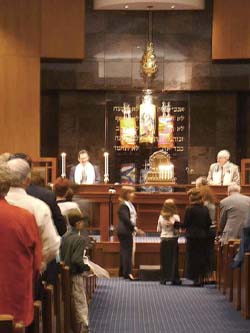
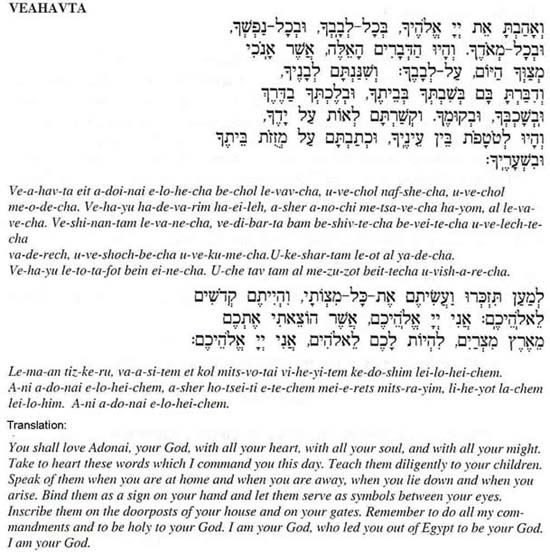 |
Click Here and Here to Listen to the Veahavta |
The Michamocha
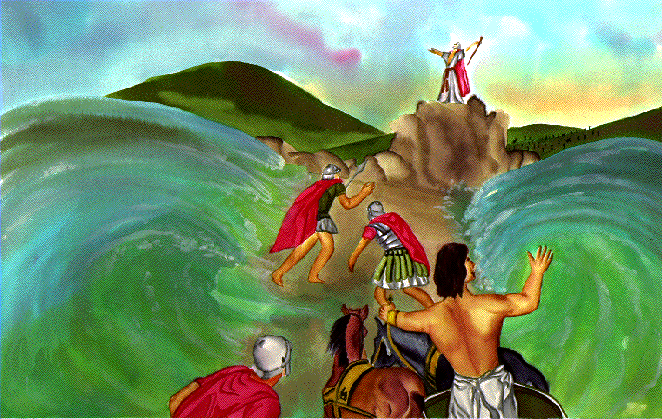
Mi Chamocha is sometimes called Miriam's Song or the Song of the Sea. It is a celebration of the crossing of the Red Sea and resonates through all generations as a celebration of God's care and redemptive power in our individual and collective lives.
 |
Here to listen to the Micamocha |
I Am Your God
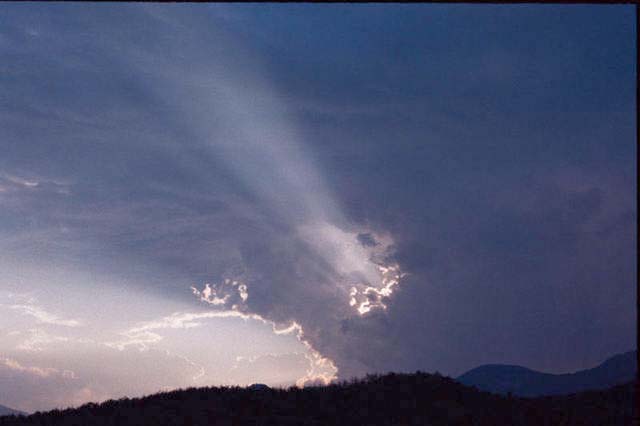
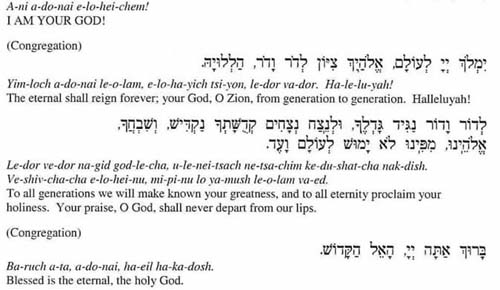 |
The Haskiveinu
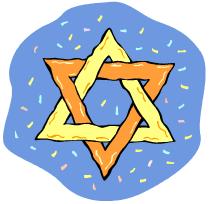
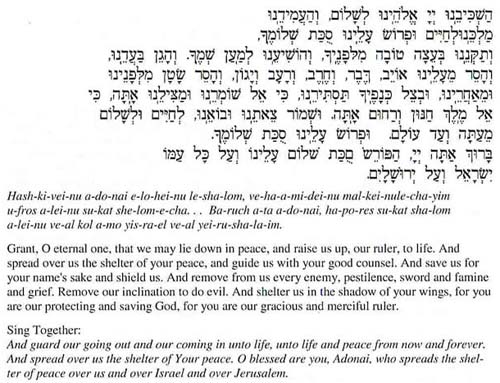 |
Mourner's Kaddish
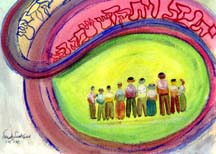 The Kaddish is a prayer that praises God and expresses a yearning for the establishment of God's kingdom on earth. The emotional reactions inspired by the Kaddish come from the circumstances in which it is said: it is recited at funerals and by mourners.
The Kaddish is a prayer that praises God and expresses a yearning for the establishment of God's kingdom on earth. The emotional reactions inspired by the Kaddish come from the circumstances in which it is said: it is recited at funerals and by mourners.
The word Kaddish means sanctification, and the prayer is a sanctification of God's name. Kaddish is only said with a minyan (prayer quorum of ten men), following a psalm or prayer that has been said in the presence of a minyan, since the essence of the Kaddish is public sanctification. The one who says Kaddish always stands. Since the Holocaust, the Reform Jewish custom has been for the entire congregation to rise for the recitation of the Kaddish.
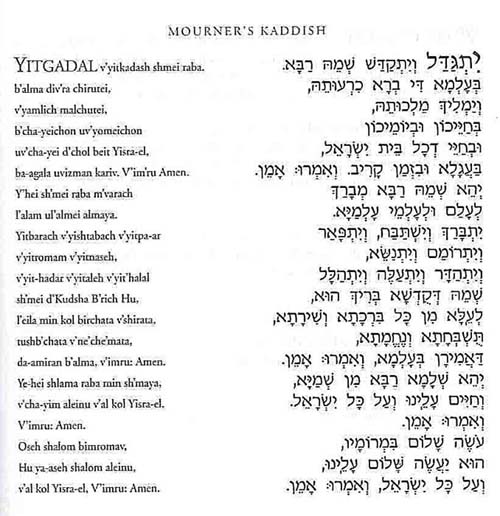 |
Click Here to listen to the Kaddish. |
Gevurot
Gevurot roughly translated, means "mighty deeds". This calls God a source of blessing, supporter of the fallen, author of freedom, and our hope in death as in life. In the context of many persecutions and disasters, this prayer has no doubt provided comfort through every Jewish generation.
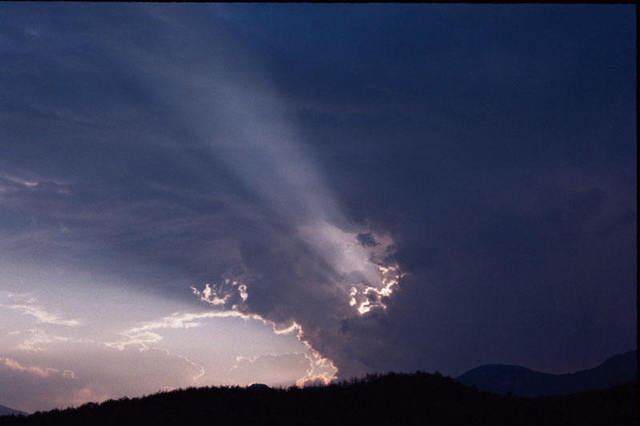
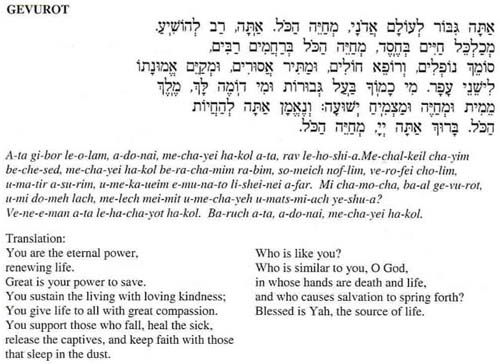 |
Click Here to Listen to the Gevurot |
Oseh Shalom
Shalom Rav, Yihiu L'Ratzon and Oseh Shalom are invitations to draw inward, to pray individually for lasting peace and pray that we may perform good deeds that contribute to that peace. Yihiu L'Ratzon and Oseh Shalom combined are a prayer written by Mar ben Rabina in the fourth century C.E., and are sometimes referred to as Mar's Prayer.
 |
Click Here to listen to Oseh Shalom |
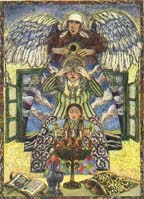 The Kidushah
The Kidushah
Kedushah means holiness. This prayer is a proclamation of God's holiness. The Kedushah acquired special significance during the fifth century CE when Jews of Persia were prohibited from saying the Sh'ma. This prayer cleverly weaves in the words of the Sh'ma and was overlooked by those who spied on services to be sure the Sh'ma was not said. Some people stand on their toes when saying kadosh kadosh kadosh (holy holy holy.) The words are from Isaiah 6:3 which refers to a vision of angels, and standing on toes symbolizes the movement of angels. It also symbolizes the lifting of the spirit.
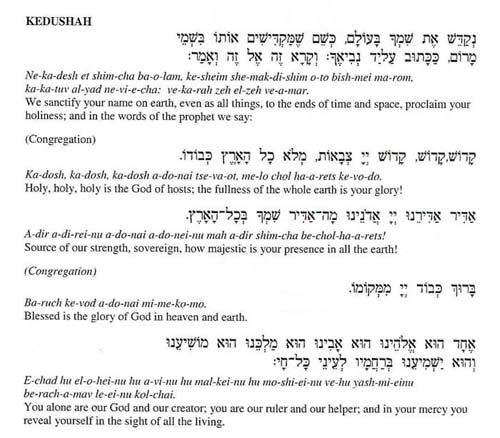 |
Click Here to listen to the Kidushah |
The Shehecheyanu
Shehecheyanu is a blessing that is recited whenever a Mitzvah is performed for the first time each year or when a fruit is eaten for the first time each season or when you get a new suit that you’re really excited about (and other times). The blessing expresses thanks to God for sustaining us and bringing us to this day.
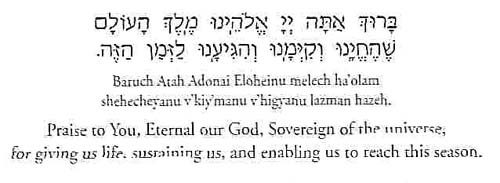 |
Shalom
Shalom Rav, Yihiu L'Ratzon and Oseh Shalom are invitations to draw inward, to pray individually for lasting peace and pray that we may perform good deeds that contribute to that peace. Yihiu L'Ratzon and Oseh Shalom combined are a prayer written by Mar ben Rabina in the fourth century C.E., and are sometimes referred to as Mar's Prayer.
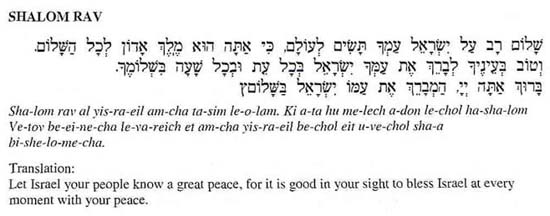 |
Click Here to listen to Shalom Rav |
Prayers for B'nai Mitzvah
Friday Evening Kiddush |
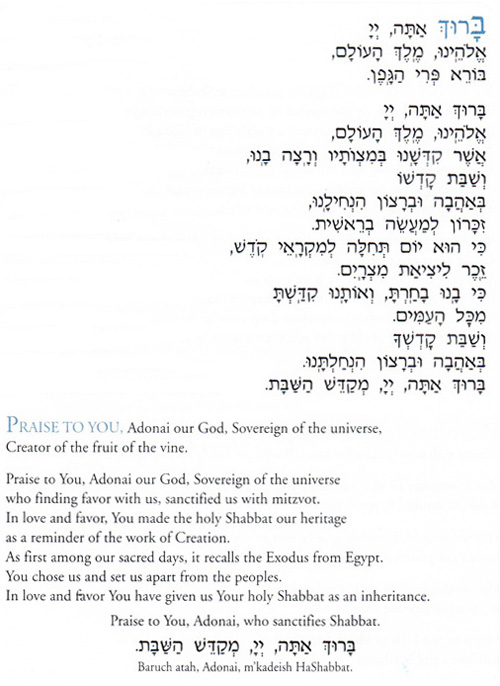 |
Listen to Kiddush |
Nisim B'Chol Yom |
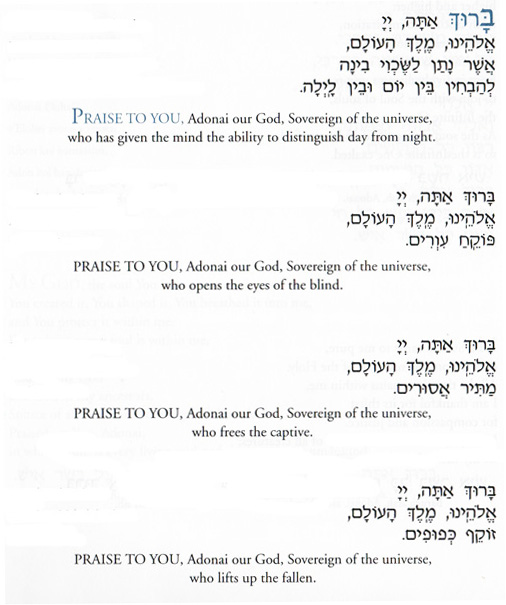 |
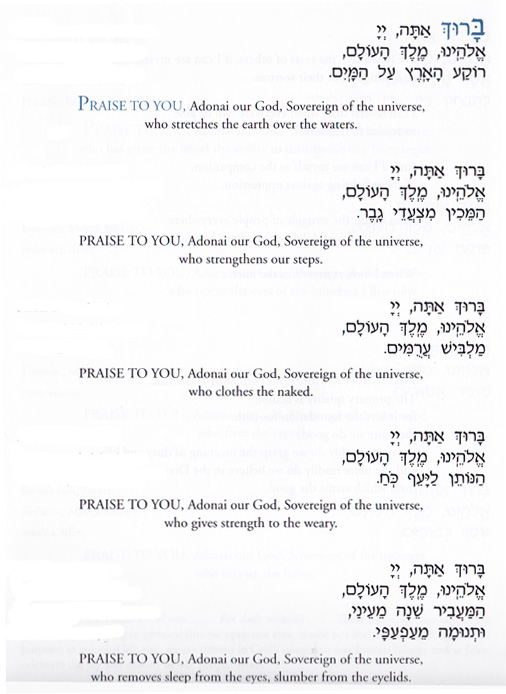 |
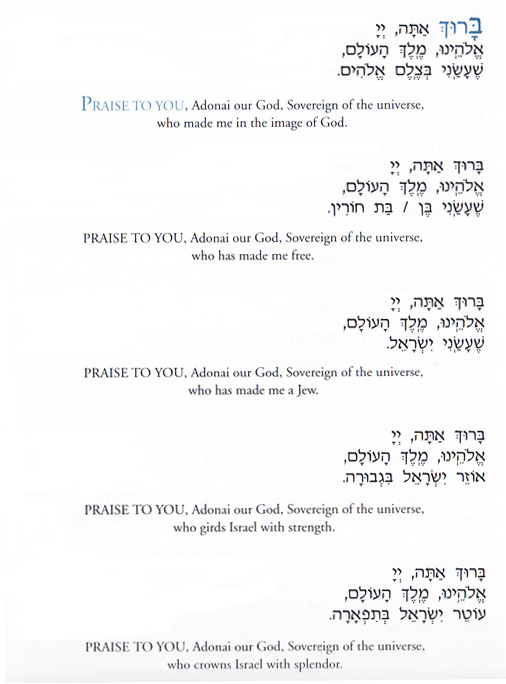 |
Listen to Nisim B'Chol Yom |
Bar'chu |
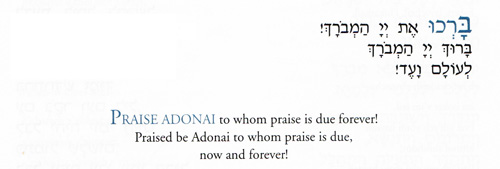 |
Listen to Bar'chu |
Yotzeir Or |
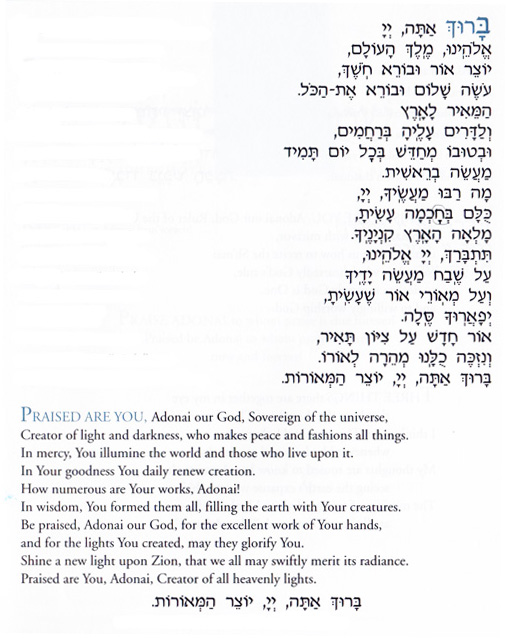 |
Listen to Yotzeir Or |
Sh'ma |
 |
 |
Listen to Sh'ma |
V'ahavta |
 |
Listen to V'ahavta |
M'Chamochah |
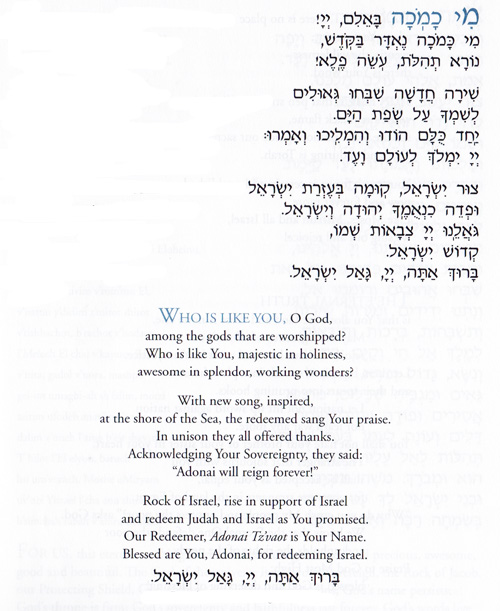 |
Listen to Mi Chamochah |
Adonai S'fatai |
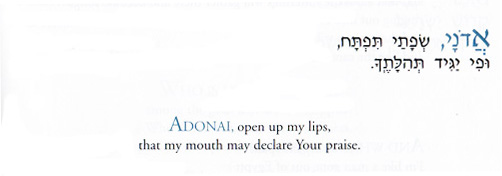 |
Listen to Adonai S'fatai |
Avot |
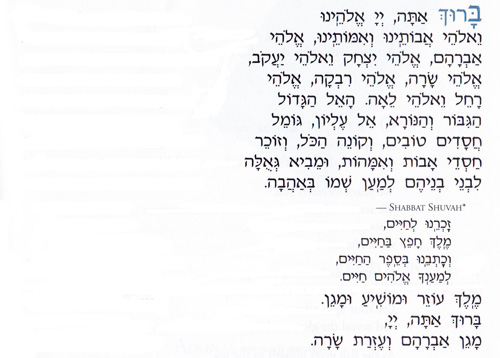 |
Listen to Avot |
G'vurot |
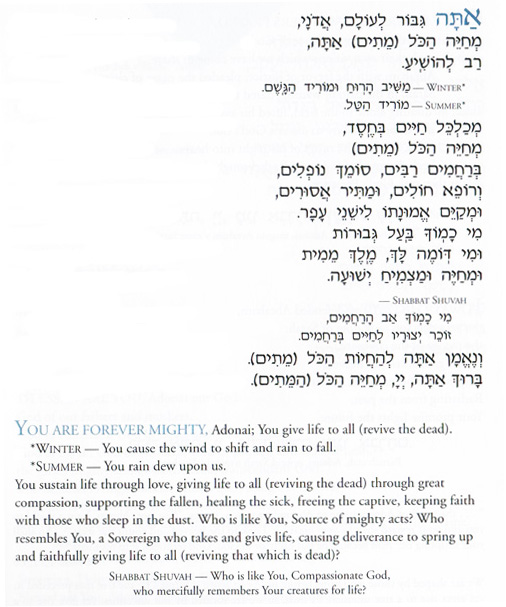 |
Listen to G'vurot |
K'dushah |
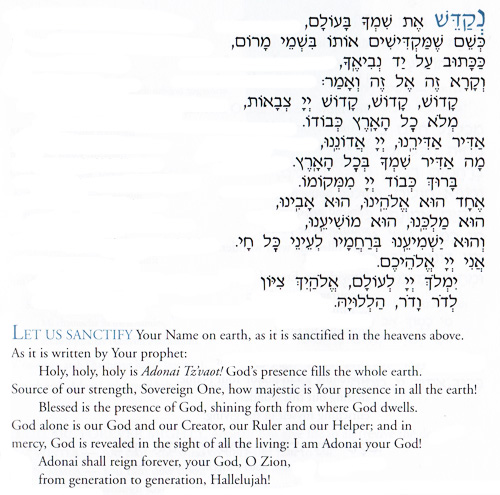 |
Listen to K'dushah |
Sim Shalom/Prayer for Peace |
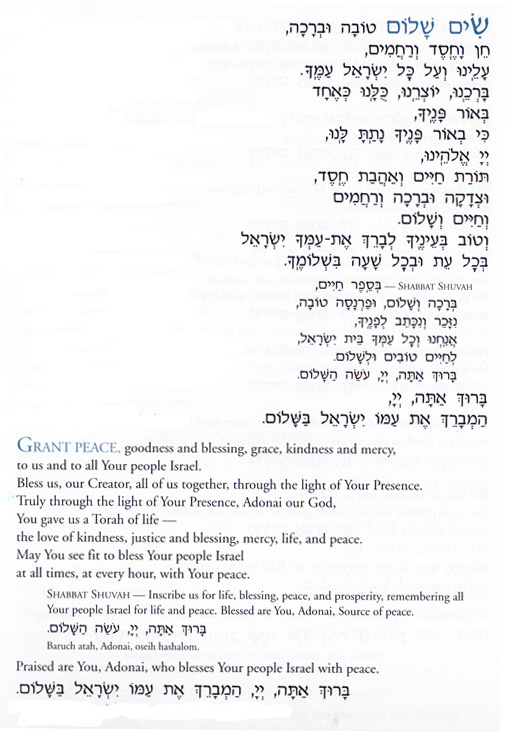 |
Listen to Sim Shalom/Prayer for Peace |
Oseh Shalom |
 |
Listen to Oseh Shalom |
Torah Blessings |
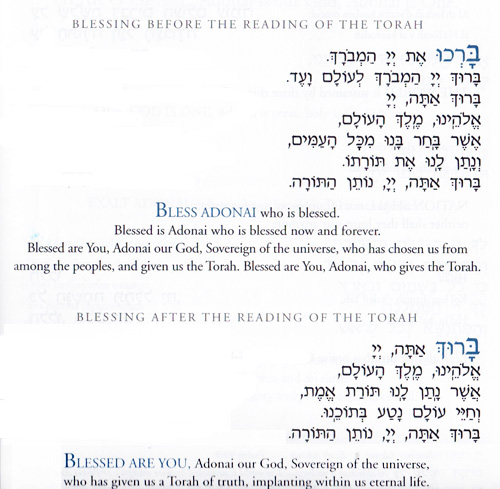 |
Haftarah Blessings |
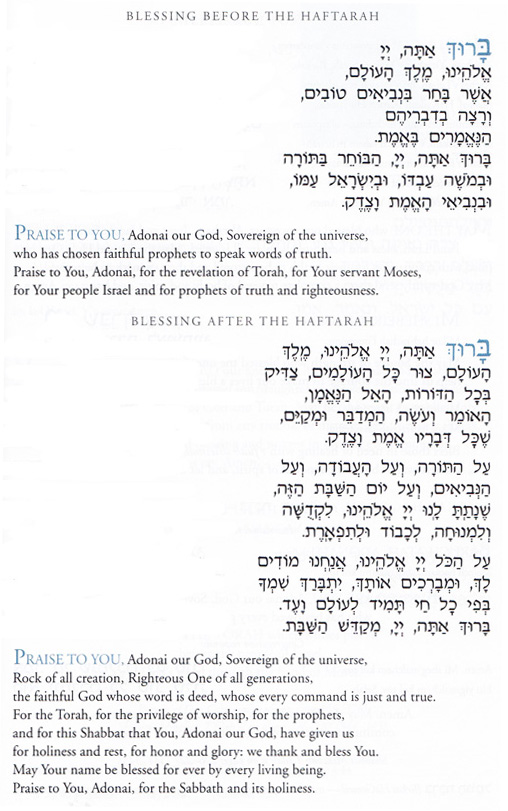 |
Listen to Blessing Before Reading Haftarah - Listen to Blessings After Reading Haftarah |
Aleinu |
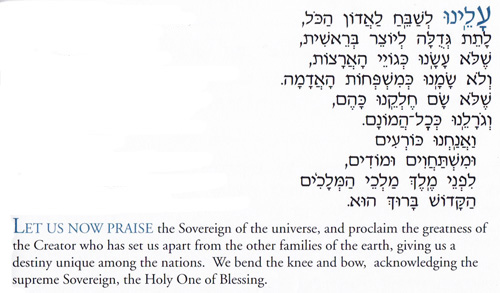 |
Listen to Aleinu |
Tallit Blessing |
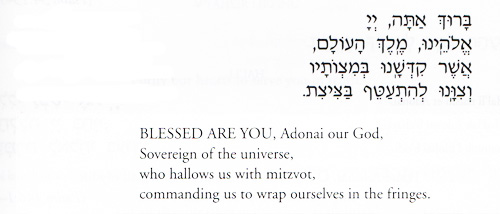 |
Listen to Tallit Blessing |
Shehecheyanu |
 |
Listen to Shehecheyanu |
Prayers for Friday Evening
Candle Blessing |
||
 |
||
Listen to the Candle Blessing |
||
Kiddush |
||
Listen to Kiddush |
||
Shalom Aleichem |
||
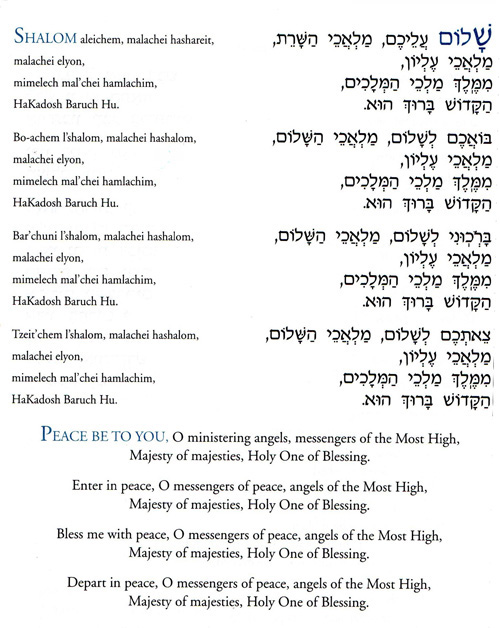 |
||
Listen to Shalom Aleichem |
||
Chatzi Kaddish |
||
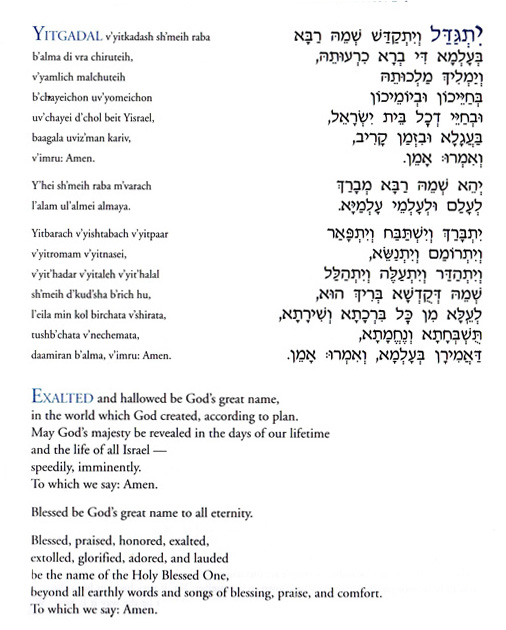 |
||
Listen to Chatzi Kaddish |
||
Bar'chu |
||
 |
||
Sh'ma |
||
 |
||
 |
||
Listen to Sh'ma |
||
V'ahavta |
||
 |
||
Listen to V'ahavta |
||
Mi Chamochah |
||
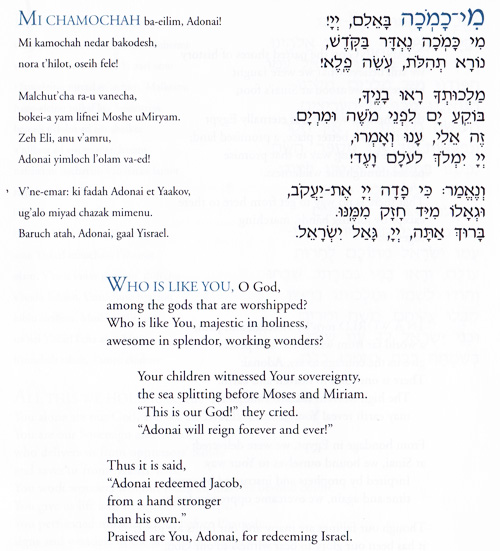 |
||
Listen to Mi Chamochah |
||
Hashkiveinu |
||
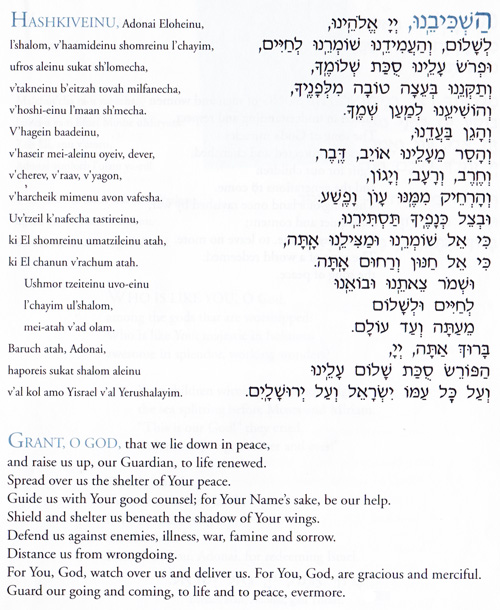 |
||
Listen to Hashkiveinu |
||
Mi Shebeirach |
||
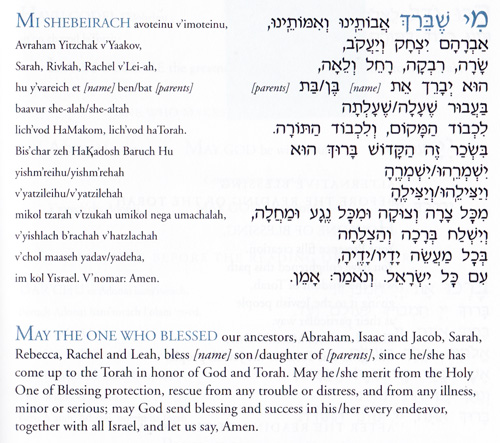 |
||
Listen to Mi Shebeirach |
||
Adonai S'fatai |
||
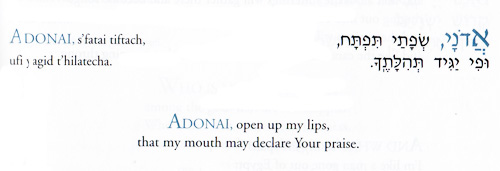 |
||
Listen to Adonai S'fatai |
||
Avot |
||
 |
||
Listen to Avot |
||
G'vurot |
||
 |
||
Listen to G'vurot |
||
Shalom Rav |
||
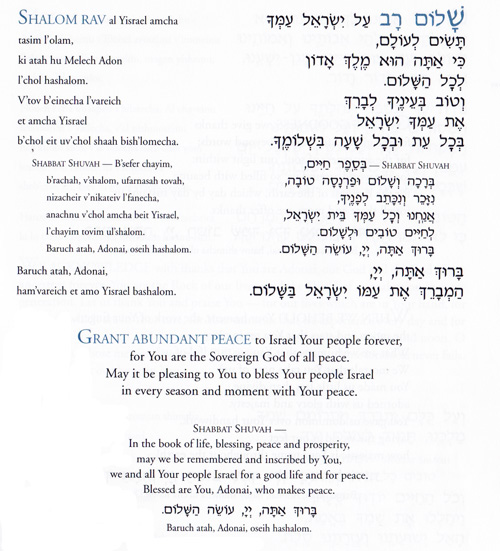 |
||
Listen to Shalom Rav |
||
Oseh Shalom |
||
 |
||
Listen to Oseh Shalom |
||
Mourner's Kaddish |
||
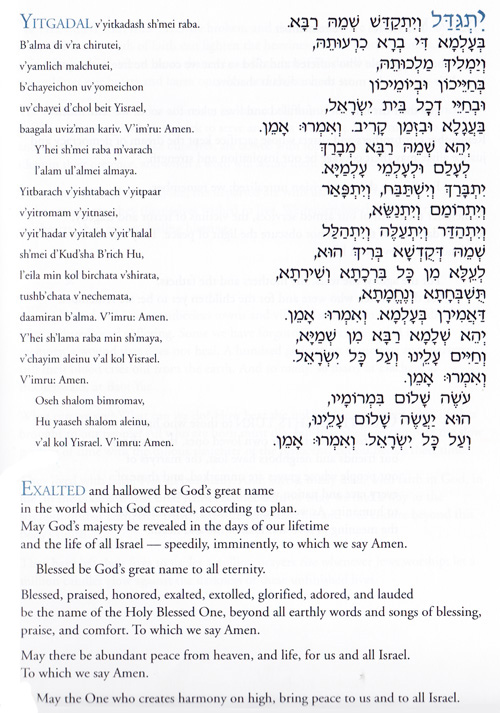 |
||
Listen to Mourner's Kaddish |
||
Our Prayers
For over 5,000 years Jews have prayed to God with one voice. Any Jew can walk into any Synagogue in the world and feel comfortable with familiar prayers. Our Temple is no exception. Our children are educated so that they may appreciate our common dedication to prayer.
|
|||||||
Prayers for Shabbat Morning
Nisim B'Chol Yom |
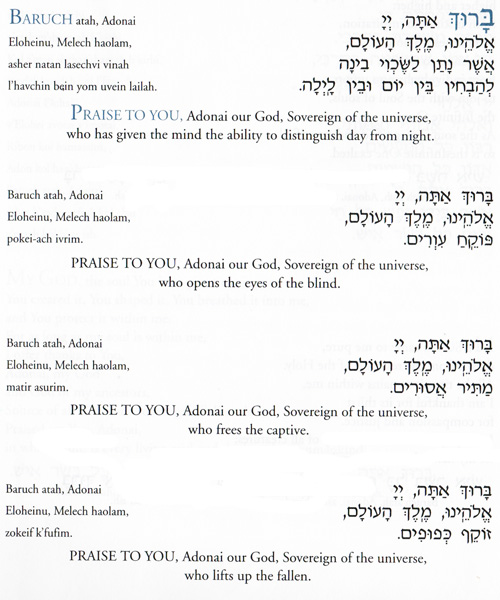 |
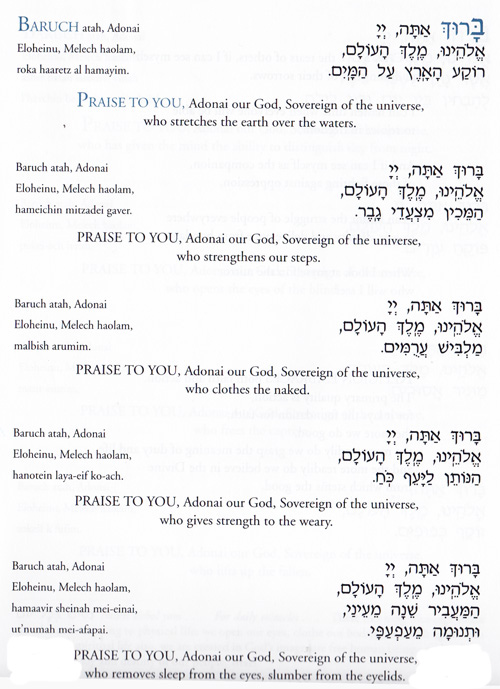 |
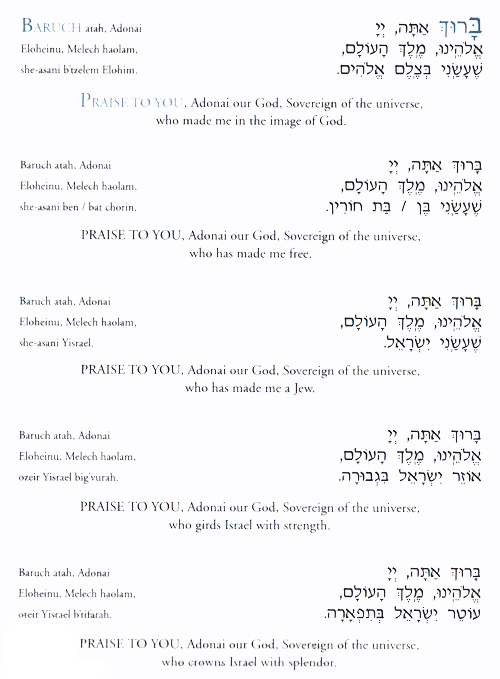 |
Listen to Nisim B'chol Yom |
Bar'chu |
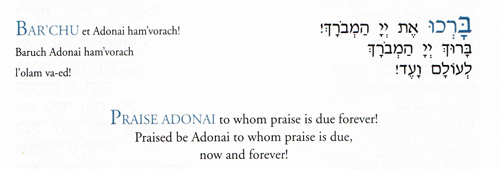 |
Listen to Bar'chu |
Sh'ma |
 |
 |
Listen to Sh'ma |
V'ahavta |
 |
Listen to V'ahavta |
Mi Chamochah |
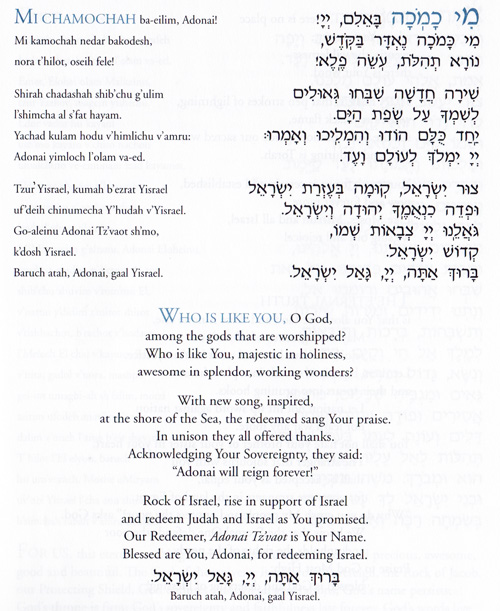 |
Listen to Mi Chamochah |
Adonai S'fatai |
 |
Listen to Adonai S'fatai |
Avot |
 |
Listen to Avot |
G'vurot |
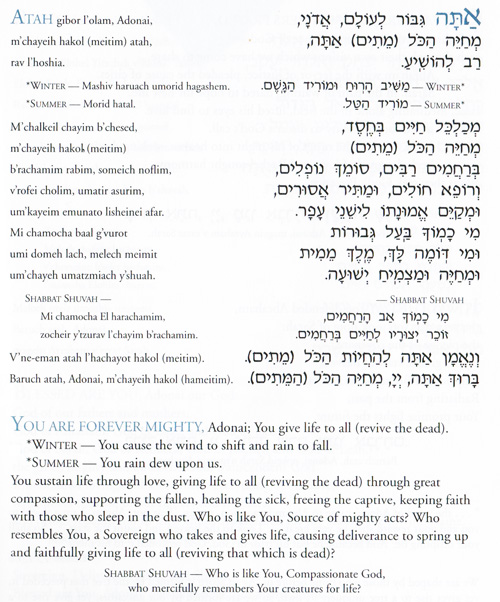 |
Listen to G'vurot |
K'dushah |
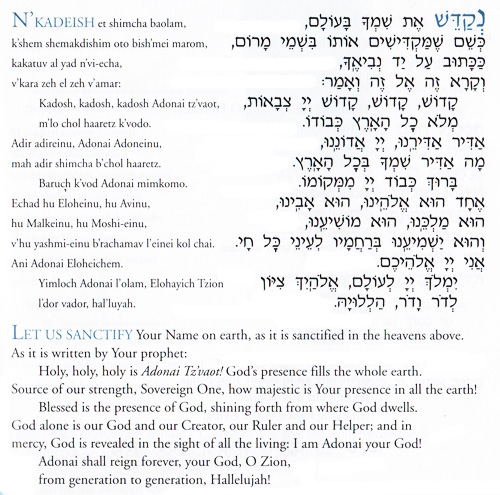 |
Listen to K'dushah |
Sim Shalom/Prayer for Peace |
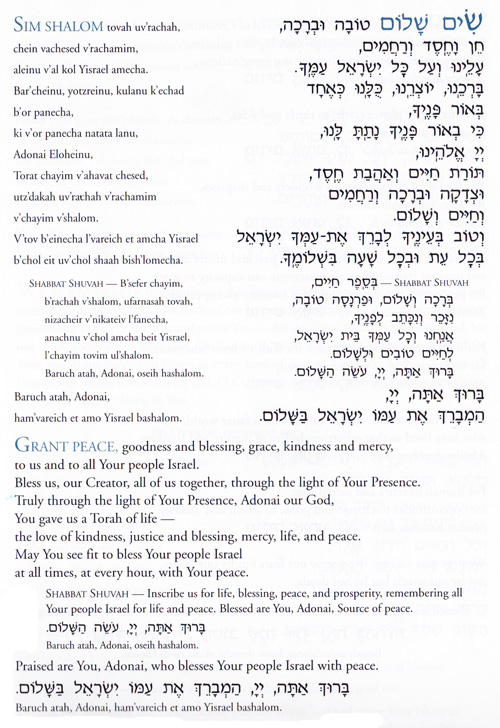 |
|
Oseh Shalom |
 |
Listen to Osh Shalom |
Torah Blessings |
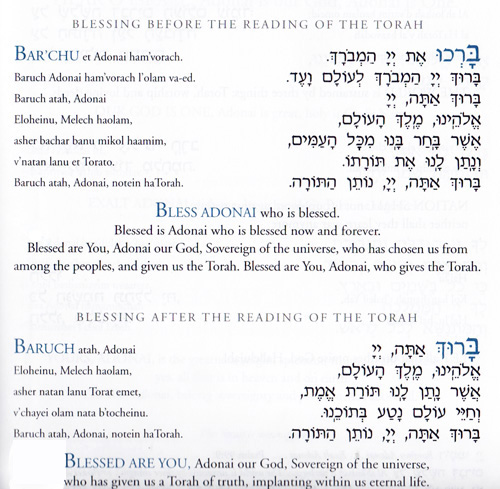 |
Listen to the Blessings Before Reading the Torah - Listen to Blessings After Reading the Torah |
Haftarah Blessings |
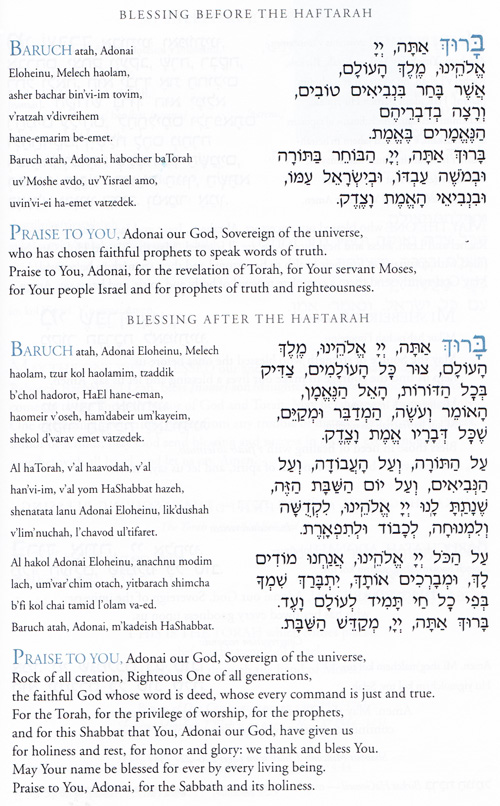 |
Listen to Blessing Before Reading Haftarah - Listen to Blessings After Reading Haftarah |
Aleinu |
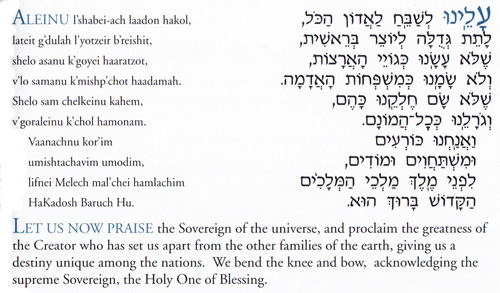 |
Listen to Aleinu |
Mourner's Kaddish |
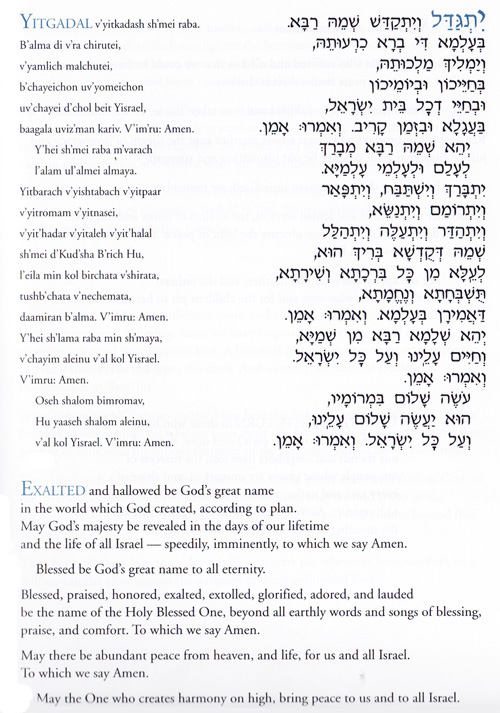 |
Listen to Mourner's Kaddish |
Our Prayers
For over 5,000 years Jews have prayed to God with one voice. Any Jew can walk into any Synagogue in the world and feel comfortable with familiar prayers. Our Temple is no exception. Our children are educated so that they may appreciate our common dedication to prayer.
|
||||||
Contact Us
|
|
|
Search |
|
Quick Links |
|
Donate / Annual Giving
Search Library Religious School Preschool High Holiday Youth Program About Us Directions Mahjongg Tournament |
:: About Us :: Directions ::
The Temple
Congregation Ohabai Sholom
5015 Harding Road
Nashville, TN 37205
615-352-7620
[email protected]
www.templenashville.org

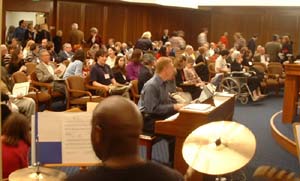
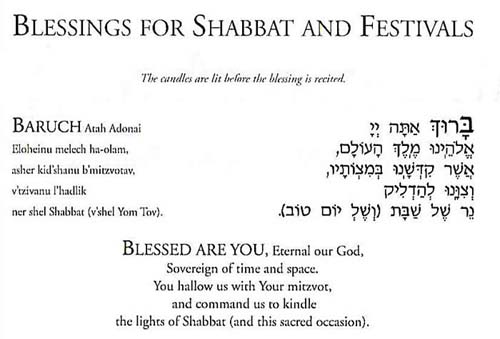
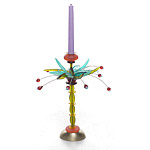
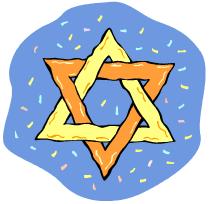 s a prayer that our Tefilah might be sincere.
s a prayer that our Tefilah might be sincere. 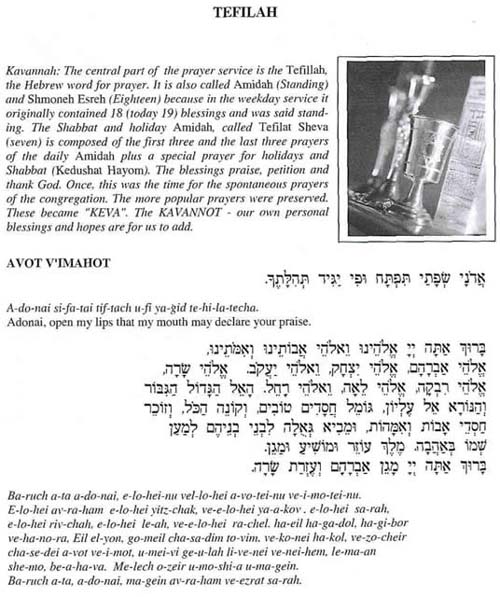

 Blessing Before Reading Torah
Blessing Before Reading Torah